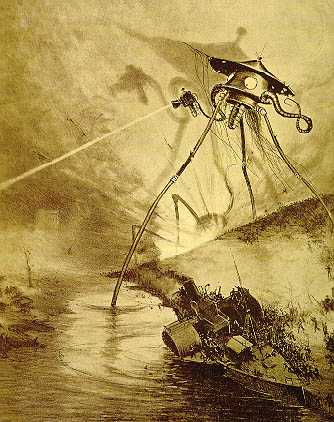
And starts to come to terms with the difference that makes:
If the revelation that humans are probably alone in our universe stands, and as that revelation sinks into our collective psyche, it could effect a second, weirder Copernican revolution in culture. To begin with, it’s really hard to square humanity’s status as perhaps the only intelligent species in all of time and space with the idea that we are insignificant. To the contrary, the everyday breath of the least of us contains meaning in so concentrated a form that a cup’s worth of it could be doled out to a dozen star systems, transforming the arid matter into a garden of significance.
There’s been a lot of talk in literary and philosophical circles of a new “post-secular” age. And some writers, like Marilynne Robinson in her stunning novel Gilead, have discovered old religious skins for the new wine of our time. But in truth, human culture never left the non-secular world behind. The 20th-century fantasies of alien intelligence were just a modern version of religious literature. Religion, after all, conceived of a relation between two intelligences—one human, one not. Books from Arthur C. Clarke’s Rendezvous With Rama to the Strugatsky brothers’ Roadside Picnic to basically all of the late Philip K. Dick recast the ancient story of humanity’s contact with an unknowable god in the terms of alien intelligence. If humankind begins to see intelligence as one thing—just us—then religion’s service to secular literature may finally be at an end. …
There’s something retro about aliens, I thought, a vestigial remnant of the 20th century, like DeLoreans. I sat there thinking about how one could write a sci-fi novel without extraterrestrials. Then I thought—this is a weird thing I’m doing right now. Thinking. What is this? What does it feel like? … Michael W. Clune, “I Don’t Believe in Aliens Anymore” at THe Atlantic
Well, if We Are Alone, that would indeed change things.
If we are truly the only intelligent entity in the universe, then all human life is precious. One wonders, how will that affect the abortion debate?
But there is, of course, an out: According to many in neuroscience, consciousness is an illusion unless, of course, your coffee mug is conscious too. One can always give up on intelligence altogether, instead of giving up only on alien intelligence.
See also: Fixing the unfixable Drake equation
Obituary column: By the time we hear from the space aliens, they will be dead
ET still hasn’t phoned Frank Drake
and
Americans don’t fear the discovery of alien life. So why do some commentators insist they do?